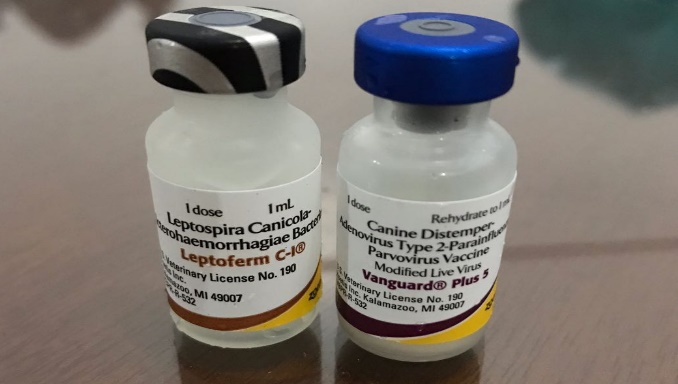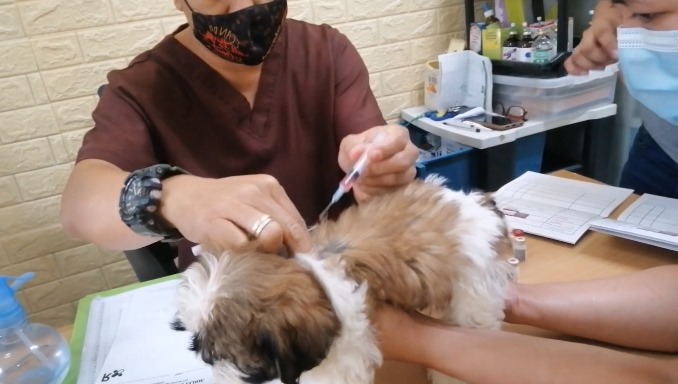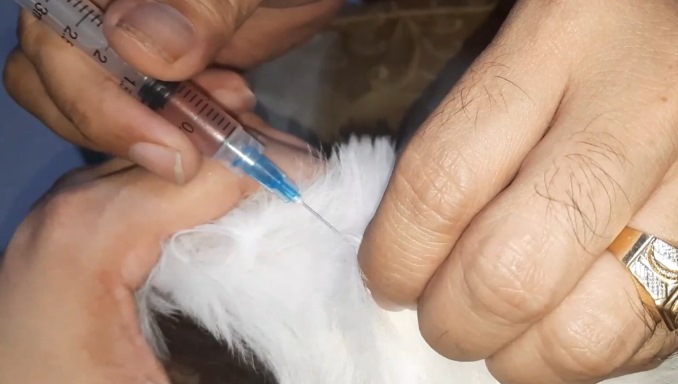What Is 5 in 1 Vaccine for Dogs?
Do you know What is 5 in 1 Vaccine For Dogs?
Dogs are susceptible to many of the same diseases as humans, and can also spread illnesses to their human companions. Diseases like Canine distemper, Adenovirus, Parainfluenza, Parvovirus can be deadly for dogs. There is now a new 5-in-1 vaccine available that protects dogs from all of these serious diseases. This vaccine is highly recommended for all dogs, especially those who spend time outdoors or come into contact with other animals. Talk to your veterinarian today about getting your dog vaccinated against these potentially deadly diseases.
Why Is It Important to Vaccinate Dogs?
Vaccinations are an important part of preventive health care for dogs. They help protect your dog from contracting potentially deadly diseases, and can also help prevent the spread of these diseases to other dogs and even to humans. Vaccinating your dog is one of the simplest and most effective ways to keep both your pet and your family healthy.
What Is 5 in 1 Vaccine for Dogs and is it important?
There are a number of different vaccines available for dogs, and your veterinarian can help you determine which ones are right for your pet based on his or her age, health status, lifestyle, and risk of exposure to disease. Some of the most common vaccinations given to dogs include those for rabies, distemper, hepatitis, parvovirus, and Lyme disease.
Rabies is a potentially deadly virus that affects the nervous system and is transmitted through saliva. All dogs should be vaccinated against rabies, as there is no cure for the disease. Distemper is a highly contagious virus that can cause severe respiratory illness, gastrointestinal problems, and neurologic damage in dogs. Hepatitis is a viral infection that affects the liver and can be deadly. Parvovirus is a highly contagious virus that primarily affects puppies, but can also be deadly in adult dogs. Lyme disease is caused by bacteria transmitted through the bite of an infected tick, and can cause a number of serious health problems including lameness, kidney disease, and even death.
Vaccinating your dog is one of the best ways to protect him or her from these and other dangerous diseases. Talk to your veterinarian about which vaccines are right for your pet.
5 in 1 Vaccine For Dogs History
What Is 5 in 1 Vaccine for Dogs history? The 5-in-1 vaccine for dogs was first developed in the early 1990s. It was created in response to the growing number of canine distemper outbreaks that were occurring around the world. The vaccine is a “modified live virus” vaccine, which means that it contains live viruses that have been weakened so that they can’t cause disease in healthy dogs. The vaccine is given as an injection, and it works by stimulating the dog’s immune system to produce antibodies that protect against the distemper virus.
The 5-in-1 vaccine is now considered a “core” vaccine for dogs, which means that it is recommended for all dogs, regardless of their lifestyle or exposure risk. The vaccine is typically given to puppies at around 8 weeks of age, and then again at 12 weeks and 16 weeks. After that, the vaccine is given on an annual basis.
The 5-in-1 vaccine is very effective at preventing canine distemper, and it has been shown to reduce the severity of the disease if a dog does contract it. The vaccine is also effective at preventing adenovirus, parainfluenza, and parvovirus.

What Is 5 in 1 Vaccine For Dogs? (DHPP Vaccine)
The 5 in 1 vaccine for dogs is a new vaccine that protects dogs from five serious diseases: Canine distemper virus D, two types of Adenovirus (Aka Hepatitis and Kennel Cough A, A2, or H), Parainfluenza P, and Parvovirus P. This vaccine is highly recommended for all dogs, especially those who spend time outdoors or come into contact with other animals.
Canine distemper is a serious disease that can be deadly for dogs. It is caused by a virus that attacks the respiratory, gastrointestinal, and nervous systems of dogs. Symptoms of canine distemper include fever, runny nose, watery eyes, coughing, vomiting, diarrhea, lethargy, and seizures. Canine distemper is highly contagious and can spread quickly through contact with infected animals or their secretions. There is no cure for canine distemper, and it is often fatal.
Adenovirus is a virus that can cause two serious diseases in dogs: hepatitis and kennel cough. Hepatitis is an infection of the liver that can cause fever, vomiting, diarrhea, jaundice, and death. Kennel cough is a highly contagious respiratory disease that causes coughing, sneezing, and difficulty breathing. Both of these diseases are serious and can be fatal in dogs.
Parainfluenza is a virus that causes a mild to severe respiratory infection in dogs. Symptoms include coughing, sneezing, and difficulty breathing. Parainfluenza is highly contagious and can spread quickly through contact with infected animals or their secretions.
Parvovirus is a virus that causes severe gastrointestinal illness in dogs. Symptoms include vomiting, diarrhea, weight loss, and dehydration. Parvovirus is highly contagious and can spread quickly through contact with infected animals or their feces. Parvovirus is often fatal in dogs, especially young puppies.
The 5 in 1 vaccine is the best way to protect your dog from these serious diseases. Talk to your veterinarian today about getting your dog vaccinated against these potentially deadly diseases.
When Does My Dog Need the DHPP Vaccine?
The DHPP vaccine is given to puppies at 8, 12, and 16 weeks of age. Adult dogs need a booster DHPP vaccine every 3 years.
Risks and Side Effects of the DHPP Vaccine
The DHPP vaccine is safe for most dogs. Some dogs may experience mild side effects such as fever, lethargy, and loss of appetite. These side effects usually resolve within a few days. Serious side effects are rare and typically occur only in dogs with pre-existing medical conditions.
Advantages of a 5-in-1 Vaccine
The 5 in 1 vaccine is the best way to protect your dog from these serious diseases. The vaccine is safe for most dogs and has few side effects. The vaccine is also highly effective at preventing these diseases. It also saves time and money as you only need to get one vaccine instead of five separate vaccines.
There are no disadvantages of the 5 in 1 vaccine. The only potential downside is that some dogs may experience mild side effects after vaccination. These side effects are typically short-lived and resolve within a few days.
Vaccinating your dog with the 5 in 1 vaccine is the best way to protect them from these serious diseases. Talk to your veterinarian today about getting your dog vaccinated against these potentially deadly diseases.
DHPP Vaccine Price
The cost of the DHPP vaccine varies depending on the brand, your location, and whether you get it from a veterinary office or a pet store. The average cost of the DHPP vaccine is $30 to $90.
What Is 5 in 1 Vaccine for Dogs ? Now you know all about it!

When Should You Not Use DHPP Vaccine For Dogs?
You should not use DHPP vaccine for dogs if your dog is:
-Allergic to any of the ingredients in the vaccine
-Sick or injured
-Pregnant or nursing
-Under 4 weeks of age
If you have any concerns about whether or not the DHPP vaccine is right for your dog, talk to your veterinarian.
Where Should I Get DHPP Vaccine For Dogs?
You can get DHPP vaccine for dogs from your veterinarian or from a pet store. If you are getting the vaccine from a pet store, make sure that the store is reputable and that the vaccine is properly stored and administered.
Precautions
As with any vaccine, there is a small risk of side effects from the DHPP vaccine. The most common side effects are mild and include fever, lethargy, and loss of appetite. More serious side effects are rare, but can include allergic reactions, seizures, and paralysis. If you notice any side effects after your dog is vaccinated, talk to your veterinarian immediately.
As with any vaccine, it is important to follow the manufacturer’s instructions for storage and administration. The DHPP vaccine should be stored in the refrigerator and should be given to your dog as directed by your veterinarian. What Is 5 in 1 Vaccine for Dogs funcion help they don’t get DHPP?
Does DHPP Have An Expiration Date?
Yes, DHPP vaccine has an expiration date. The expiration date is printed on the label of the vaccine vial and is typically one year from the date of manufacture. It is important to follow the manufacturer’s instructions for storage and administration of the vaccine to ensure that it remains effective.
What if my dog misses a DHPP vaccine?
If your dog misses a DHPP vaccine, don’t worry – he can still receive the vaccine at his next visit to the vet. The most important thing is to keep your dog up-to-date on his vaccinations, so he is protected against potentially deadly diseases.
Talk to your veterinarian about the best way to proceed. You may need to have your dog vaccinated as soon as possible or start the vaccination series over from the beginning.
How to Take Care of Dogs After DHPP Vaccination
After your dog is vaccinated with DHPP, there are a few things that you can do to help them stay healthy and prevent the spread of disease.
First, make sure that your dog has plenty of fresh water to drink. Dogs who are vaccinated against DHPP are at risk for dehydration, so it is important to keep them well-hydrated.
Second, keep your dog away from other dogs for at least two weeks after vaccination. This will help to prevent the spread of disease and will allow the vaccine to work properly.
Third, watch for any side effects after vaccination. The most common side effects are mild and include fever, lethargy, and loss of appetite. More serious side effects are rare, but can include allergic reactions, seizures, and paralysis. If you notice any side effects after your dog is vaccinated, talk to your veterinarian immediately.
By following these simple tips, you can help your dog stay healthy and prevent the spread of disease.
Now you already know What Is 5 in 1 Vaccine for Dogs and how to take care of dogs after DHPP Vaccination, keep reading!

Things To Remember When Vaccinating Dogs
When it comes to vaccinating your dog, there are a few things you should keep in mind. First and foremost, always consult with your veterinarian to determine which vaccines are right for your dog based on their age, health status, and lifestyle. Secondly, make sure you follow the vaccine schedule recommended by your vet. Finally, be sure to keep an eye out for any adverse reactions following vaccination, and report them to your vet right away.By following these simple tips, you can help ensure that your dog stays healthy and protected against disease.
Can I Vaccinate My Dog Myself?
No, you should not attempt to vaccinate your dog yourself. Vaccinating a dog is a delicate process that requires the expertise of a licensed veterinarian. Attempting to do it yourself could put your dog at risk for serious health complications.
Dog boarding without vaccinations
If you are planning on boarding your dog, make sure to check with the facility first to see if they require any specific vaccinations. Many facilities will require that your dog be up-to-date on their rabies vaccination, as well as other common vaccines such as bordetella and parvovirus. Failure to comply with these requirements could result in your dog being denied entry to the boarding facility.
Vaccinating your dog is an important part of keeping them healthy and protecting them from disease. By following these simple tips, you can help ensure that your dog stays safe and healthy.
Where Can I Get My Dog’s DHPP Vaccine For Free?
Contact your local Humane Society or SPCA to see if they offer free or low-cost vaccinations for dogs. Additionally, many veterinarans offer vaccine clinics where you can get your dog vaccinated at a reduced rate.
Other Vaccines For Dogs
In addition to the DHPP vaccine, there are other vaccines that your dog may need depending on their lifestyle and risk of exposure to certain diseases.
- The Bordetella vaccine is given to dogs who are at high risk for exposure to Bordetella bronchiseptica, a bacteria that causes kennel cough. Dogs who are often around other dogs, such as those who go to dog parks, daycare, or boarding facilities, are at higher risk for exposure and should be vaccinated.
- The Lyme disease vaccine is given to dogs who are at high risk for exposure to Borrelia burgdorferi, a bacteria that causes Lyme disease. Dogs who live in areas where Lyme disease is common, such as the Northeast and Upper Midwest United States, are at higher risk for exposure and should be vaccinated.
- The leptospirosis vaccine is given to dogs who are at high risk for exposure to Leptospira bacteria. Dogs who live in areas where leptospirosis is common, such as the tropics and subtropics, are at higher risk for exposure and should be vaccinated.
- Kennel cough vaccine is not a required vaccine, but it may be recommended for dogs who are at high risk for exposure to Bordetella bronchiseptica, a bacteria that causes kennel cough. Dogs who are often around other dogs, such as those who go to dog parks, daycare, or boarding facilities, are at higher risk for exposure and should be vaccinated.
- Rabies vaccine is a vaccine used to prevent rabies. There are many different types of rabies vaccines available, but all are highly effective in preventing the disease. The most common type of vaccine is the inactivated (killed) rabies virus vaccine, which is given by injection. Other types of vaccines, such as the live attenuated (modified) rabies virus vaccine and the recombinant (modified) rabies virus vaccine, are also available.
Rabies is a viral disease that affects the central nervous system and is almost always fatal once symptoms develop. The virus is typically spread through the bite of an infected animal, but can also be spread through contact with infected tissue or body fluids. Early symptoms of rabies include fever, headache, and general weakness. As the disease progresses, symptoms may include hallucinations, paralysis, and death. There is no specific cure for rabies, but prompt treatment with a rabies vaccine can be effective in preventing the disease.
FAQs about What Is 5 in 1 Vaccine for Dogs
My dog is going to be around other dogs. Should I get the Bordetella vaccine?
Yes, if your dog is going to be around other dogs, it is recommended that you get the Bordetella vaccine.
I live in an area where Lyme disease is common. Should I get the Lyme disease vaccine?
Yes, if you live in an area where Lyme disease is common, it is recommended that you get the Lyme disease vaccine.
My dog goes to the dog park. Should I get the kennel cough vaccine?
Yes, if your dog goes to the dog park, it is recommended that you get the kennel cough vaccine.
What are the side effects of the DHPP vaccine?
The most common side effects of the DHPP vaccine are mild and include fever, lethargy, and loss of appetite. More serious side effects are rare, but can include allergic reactions, seizures, and paralysis. If you notice any side effects after your dog is vaccinated, talk to your veterinarian immediately.
Can I walk my dog after 5-in-1 vaccine?
Yes, you can walk your dog after a 5-in-1 vaccine. However, it is important to keep in mind that your pet may still be feeling the effects of the vaccination and may not be up for strenuous activity. Additionally, depending on the vaccine, your veterinarian may recommend waiting at least 24 hours before exposing them to other animals or public places. It is important to follow your veterinarian’s advice and make sure that you are monitoring your pet for any signs of adverse reactions after the vaccine. If you have any concerns, contact your veterinarian immediately.
Conclusion
While this vaccine has been shown to be effective in preventing five major diseases in dogs, it is important to consult with your veterinarian to see if the vaccine is right for your pet.
The 5-in-1 vaccine can help protect dogs from serious and potentially deadly diseases, but like any medical procedure, there are risks associated with its use. Only you and your vet can decide if the benefits of the 5-in-1 vaccine outweigh those risks for your dog. Have you had your dog vaccinated against all five of these diseases?
Above is the article ” What is 5 in 1 vaccine for dogs?”. Thanks for reading!








